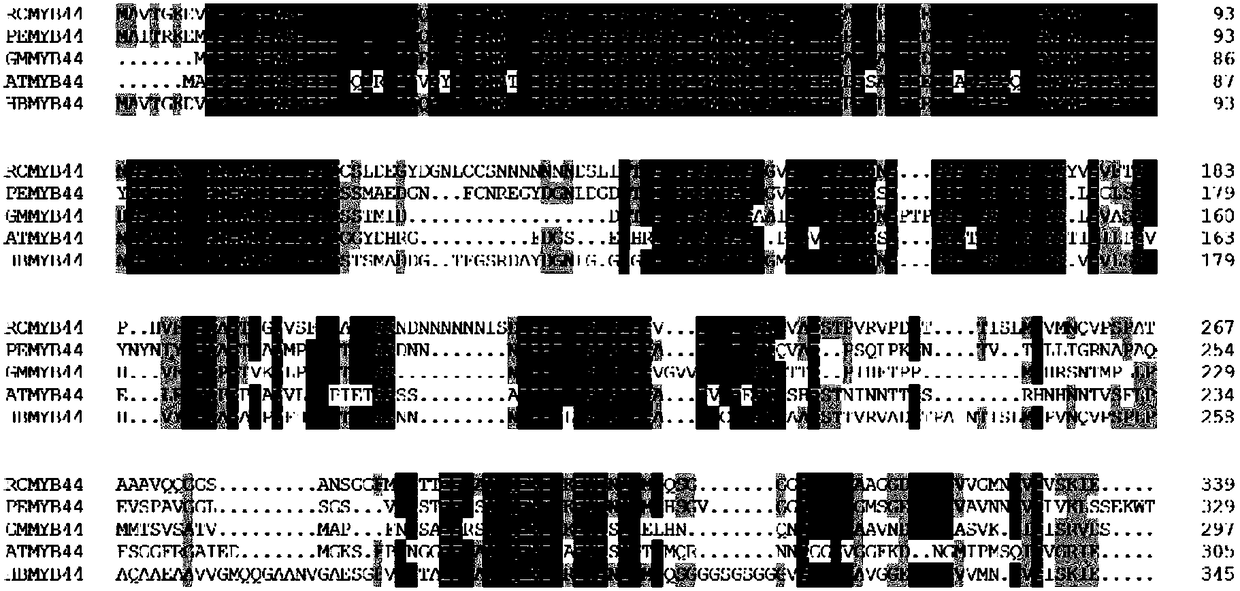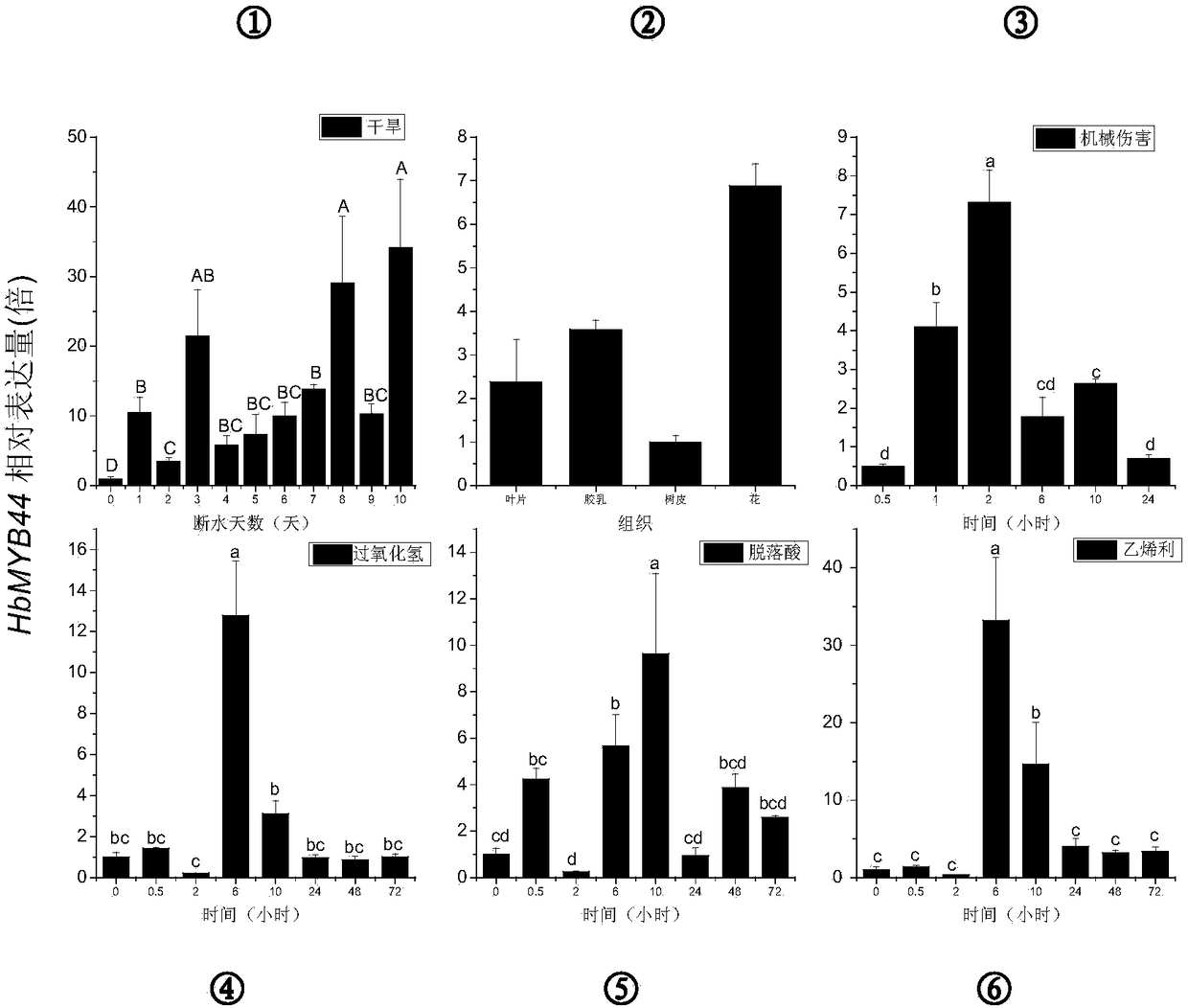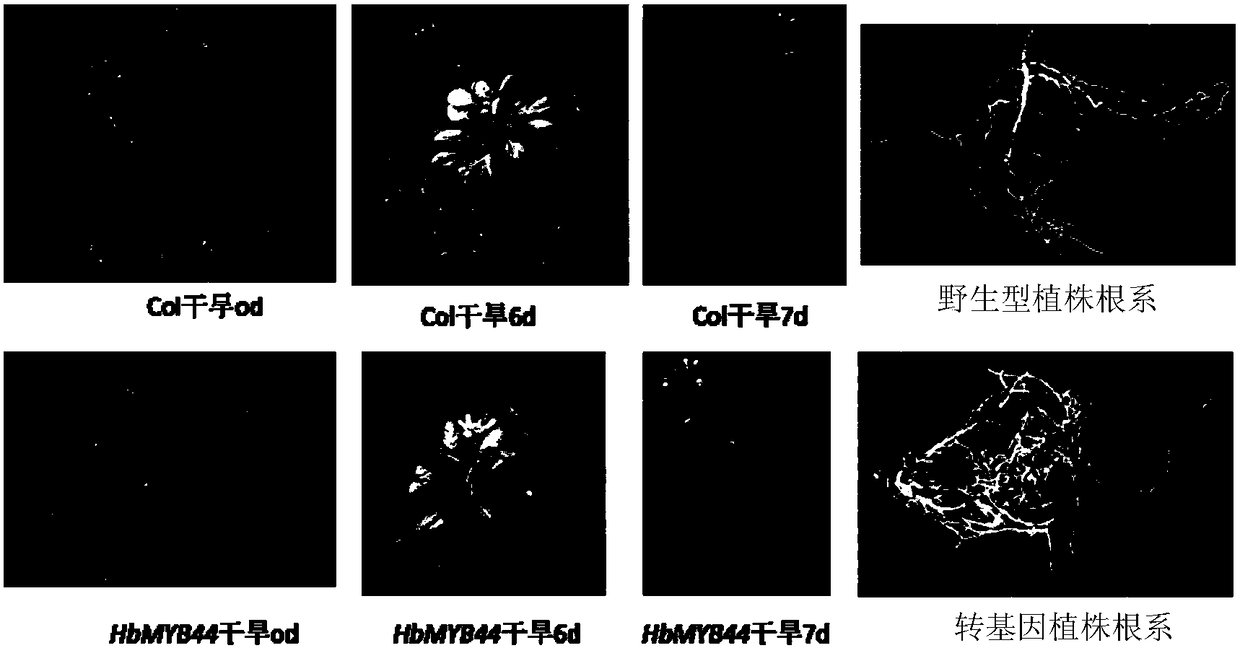Hevea transcription factor hbmyb44 gene and its application
A transcription factor, rubber tree technology, applied in the field of genetic engineering, can solve problems such as water loss, rubber tree growth and production impact, loss, etc., to achieve the effect of small environmental impact, improved plant drought resistance, and improved tolerance.
- Summary
- Abstract
- Description
- Claims
- Application Information
AI Technical Summary
Problems solved by technology
Method used
Image
Examples
Embodiment 1
[0033] Cloning of embodiment 1 rubber tree transcription factor HbMYB44 gene
[0034] The rubber tree transcription factor HbMYB44 gene was cloned from the leaves of Hevea brasiliensis variety Reyan 7-33-97 by RT-PCR technology, and the specific method was as follows:
[0035] 1. Extract the total RNA in rubber tree leaves, and reverse transcribe to obtain the first strand of cDNA.
[0036] 2. Using the first strand of cDNA as a template and HbMYB44-F and HbMYB44-R as primers, the cDNA sequence of the transcription factor HbMYB44 gene was obtained by PCR amplification reaction.
[0037] The primer sequences are as follows:
[0038] HbMYB44-F: 5′-GCCAAGCTTCCATTTTATGATTACT-3′
[0039] HbMYB44-R: 5′-CTCTGTACAATGCCCAAAATTATTC-3′
[0040] Use 2×Taq PCR MasterMix (Tiangen Biochemical) for PCR amplification, the reaction system is: 2 μL of cDNA template, 1 μL of primers F and R (10 μmol / L), 25 μL of 2×PCR MasterMix, add ddH 2 0 to 50 μL.
[0041] The PCR amplification program wa...
Embodiment 2
[0044] Expression analysis of embodiment 2 HbMYB44 gene when subjected to stresses such as drought
[0045] Fluorescent quantitative PCR was used to detect the expression of HbMYB44 gene in rubber tree leaves, latex, bark and flower tissues after drought, mechanical injury, ethephon, abscisic acid and hydrogen peroxide treatments.
[0046] Drought treatment: first water the Reyan 7-33-97 budding seedlings to saturation, then put them in the light incubator for water cut-off treatment, and continuously collect 0-10d leaves as materials.
[0047] Mechanical injury treatment: the leaves of Reyan 7-33-97 were pinched with tweezers, and leaf samples were taken at 0, 0.5, 1, 2, 6 and 12 hours, and untreated plants were used as controls.
[0048] Chemical agent treatment: with brasiliensis clone CATAS7-33-97 budding seedlings as material, spraying 200 μ M abscisic acid (ABA), 1.0% ethephon (ET) and 2% hydrogen peroxide respectively at 0, 0.5, 2 , 6, 10, 24, 48 and 72 hours to take l...
Embodiment 3
[0056] Example 3 Obtaining and drought-resistant identification of transgenic Arabidopsis plants with HbMYB44
[0057] Using the HbMYB44-18T plasmid prepared in Example 1 as a template, HbMYB44-OE-F: 5'-CCC AAGCTT ATGGCTGTTACT-3' (the underline is the HindIII restriction site) and HbMYB44-OE-R:5'-CG GGATCC CTCAATCTTACT-3' (the underline is the BamHI restriction site) was used as a primer to amplify the ORF of the HbMYB44 gene, and the amplified product was digested by HindIII and BamHI and connected to the expression vector after the same digestion (the transformed pGreenⅡ vector, That is, the mGFP-6×His fragment was inserted between the SpeI and XbaI sites of the original vector backbone), the constructed recombinant plasmid was named HbMYB44-OE-GFP, and the recombinant plasmid HbMYB44-OE-GFP was transformed into Agrobacterium GV3101 strain by electric shock method ; The HbMYB44 gene was transformed into wild-type Arabidopsis plants (Col) by the Agrobacterium-mediated metho...
PUM
 Login to View More
Login to View More Abstract
Description
Claims
Application Information
 Login to View More
Login to View More - R&D
- Intellectual Property
- Life Sciences
- Materials
- Tech Scout
- Unparalleled Data Quality
- Higher Quality Content
- 60% Fewer Hallucinations
Browse by: Latest US Patents, China's latest patents, Technical Efficacy Thesaurus, Application Domain, Technology Topic, Popular Technical Reports.
© 2025 PatSnap. All rights reserved.Legal|Privacy policy|Modern Slavery Act Transparency Statement|Sitemap|About US| Contact US: help@patsnap.com



